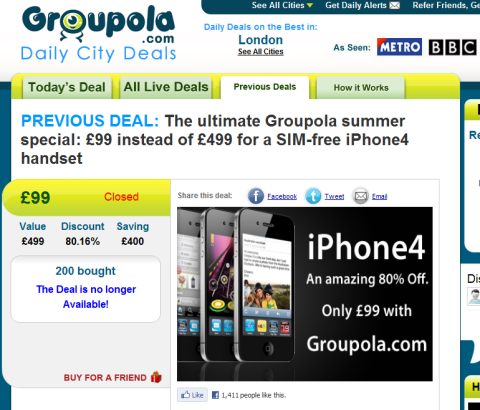Original URL: https://www.theregister.com/2010/07/06/groupola_iphone_stunt/
£99 iPhone stunt backfires
How to lose friends, the Groupola way
Posted in Personal Tech, 6th July 2010 13:09 GMT
A publicity stunt that offered a new iPhone 4 for £99 has backfired spectacularly on a new UK shopping site, and risks increasing cynicism over a controversial corner of internet marketing.
Groupola is a UK clone of the US group-buying site Groupon, founded by MyVoucherCodes founder Mark Pearson. The idea is to drum up demand for special promotions - which are pulled if not enough punters sign up. Businesses have been keen to go along so far, seeing it as a low-cost way to attract new customers using special one-off offers. In this case, however, Groupola made some odd decisions.
Last month, with a great fanfare, it announced that it had purchased an unspecified number of SIM-free iPhones itself (retail price £499) and would offer them last Friday to mailing list subscribers for £99. The company later claimed it was 200: a loss of £80,000. Yet the Guardian website uncritically reprinted Groupola's press release, without questioning if Groupola really could obtain the discount it claimed.
"It says it is able to offer such low prices because it relies on group-buying," the paper gushed, attracting dozens of critical comments.
Because of constrained supplies, even the giant mobile operators can't get hold of wholesale iPhone 4s, and some are sending subscribers to Apple Stories to sign up.
Friday rolled round, and the Groupola website went offline - the company claims, because "5 million people" attempted to login in the half hour before 9:30am. The claim was met with a few raised eyebrows.
Now consumer site Bitter Wallet finds that the company's employees have been posing as punters, in an attempt to mitigate the damage. Comments from Saqib Azhar and XeeShan Ch popped up on Facebook defending the promotion; both work for Groupola's owner Marko Media - owner of Groupola, MyVoucherCodes, We Compare and Compare Reviews.

Isn't there a law against this, you ask? Actually, there may soon be - the FSA has proposed a clampdown on Weberrific astroturfing - but it only covers financial services.
While Groupola may reckon £320,000 is money well spent, the venture is likely to increase cynicism about the affiliate marketing sector. The biggest problem such sites have is that if an offer is "too good to be true", then it probably isn't.
This didn't bother CBS-owned CNET UK, which helped hype the promotion in June, and in a witless conclusion said it didn't really care or not whether it was legit. It drooled:
Our mothers told us if something sounds too good to be true it probably is, and Mama Crave didn't raise no fools. But we admit it: we're still going to click that link come July 2nd. He who dares wins.
With consumer watchdogs as sharp as CNET, what could possibly go wrong? ®